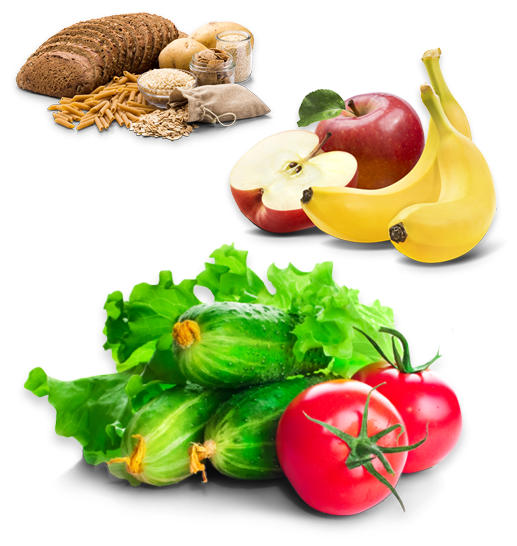Make whole grains, vegetables, fruits and pulses (legumes) such as beans and lentils a major part of your normal diet.
Scientific evidence shows that eating mostly plant-based foods — whole grains, vegetables, fruits, and beans — plays a big role in preventing cancer and contributing to a healthier life. That’s because plant-based foods are high in the types of fiber, nutrients, and phytochemicals (natural substances) that may help to prevent cancer. Plus, plant-foods can help you manage your weight, and give you the energy you need to enjoy physical activity.
Follow the New American Plate 2/3—1/3 model.
AICR’s New American Plate emphasizes foods that can reduce your risk for cancer and other chronic diseases. Get started by covering at least two-thirds (2/3) of your plate with plant foods such as whole grains, vegetables, fruit and beans. The remaining third (1/3) of your plate may be filled with animal-based protein rich foods such as seafood, poultry and dairy foods and occasionally with lean red meat.
AICR advises you eat at least 30g of fiber from food sources. Try to eat a minimum of 3.5 cups to 5 cups of vegetables and fruits each day for overall good health and to lower your cancer risk. Try to focus on incorporating a variety of whole grains into your diet regularly.
- Vegetables and fruits supply your body with vitamins, minerals and fiber that it needs to lay the foundation in your blueprint for reducing cancer risk.
- Vegetables and fruits may help to protect you from a host of cancers – such as colorectal, esophageal, mouth, pharynx, larynx, and stomach.
- AICR’s Third Expert Report cites strong evidence that eating plenty of plant foods rich in dietary fiber reduces the risk of colorectal cancer. (Animal foods contain no dietary fiber.)
- Phytochemicals (natural substances) can protect cells from the damage that may lead to cancer.
Going plant based.
Lessen your risk for cancer by embracing more plant focused meals and snacks. Instead of eating high-calorie, ultra-processed foods like chips, cookies, candy, sugary beverages, or fried foods try eating plant foods such as berries, nuts, whole-grain cereal, or hummus. Have fun with cooking and meal prep, and find healthy substitutions for dishes you enjoy.
Set yourself up for success by gradually transitioning to a diet of focusing on plant foods. The New American Plate is a great model to help you get started. Over time, your taste preferences will change to prefer less salty, less sugary, and less fatty foods.
Understanding plant based foods.
- Vegetables
Vegetables provide a multitude of cancer fighting nutrients and compounds. Whether you choose fresh, frozen, or canned (the ones without added salt or fat) veggies, include a variety of vegetables in your meals. If you eat starchy roots and tubers as staple foods be sure to include non-starchy vegetables regularly too.
- Fruits
Fruits plucked from a tree, frozen or canned (without added sugar) offer a sweet, healthy treat along with providing a range of nutrients. Although a small (6-ounce) glass of 100% fruit juice can serve as one of the day’s fruit selections, it’s best to eat fruit for its fiber and less calories. Stay away from sugary fruit beverages.
- Whole Grains
Whole grains should be a staple in your kitchen and featured in your meals. Whole grains such as oats, brown rice, and quinoa and whole-grain foods such as whole-wheat pasta and whole-grain bread provide cancer-protective fiber and phytochemicals. Whole grains contain all parts of the grain, including the healthy germ and bran. The germ and bran provide more cancer fighting fiber along with protective compounds. Refined white rice, white bread, and regular pasta lose these nutritionally rich substances during processing from whole grains to refined grains.
Did you know? Eating at least 3 ounces or servings of whole grains per day lowers risk of colorectal cancer. 1 ounce of whole grain is equivalent to 1/2 cup of cooked brown rice, 1/2 cup cooked oatmeal, 1/2 cup of cooked whole grain pasta, or 1 regular slice of whole-grain bread.
- Dried Beans
Dried beans such as pulses (legumes) are packed with cancer preventing fiber – plus, they have protein. That means beans can be used as a substitute for red meat, which can further help you reduce cancer risk. Hearty lentils, split peas, chickpeas and pinto, kidney, black, white, navy and other beans offer a variety of flavors and cooking options. Enjoy them at least a few times each week.

Check In With Your Health
The choices we make each day can help reduce our risk of cancer.
AICR's new Cancer Health Check will help you learn more about your
choices and how you can stack the odds in your favor.






